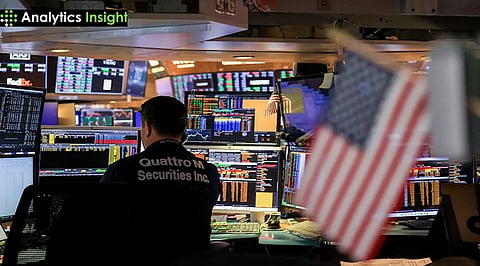

Global markets declined on Tuesday as trade tensions between the United States and China resurfaced, prompting a selloff in equities and cryptocurrencies. The S&P 500 dropped 0.5% as of 11 a.m. in New York, while the NASDAQ 100 declined 0.9%. The Dow Jones Industrial Average showed little change.
In Europe, the Stoxx 600 Index fell 0.4%, and the MSCI World Index lost 0.5%. The Bloomberg Magnificent 7 Total Return Index slipped 1.3%, reflecting weakness in major technology stocks.
Currency markets were mixed. The euro gained 0.2% to $1.1595, while the British pound fell 0.3% to $1.3296. The Japanese yen strengthened 0.3% to 151.84 per dollar. The Bloomberg Dollar Spot Index remained stable. In cryptocurrencies, Bitcoin dropped 3.7% to $111,548.23, and Ether slid 7.3% to $3,976.10 following recent volatility and large-scale liquidations.
Bond yields reflected a cautious tone. The 10-year US Treasury yield edged up one basis point to 4.04%, while Germany’s 10-year yield declined two basis points to 2.61%. Britain’s 10-year yield fell seven basis points to 4.58%.
The yield on 30-year Treasuries increased to 4.64%. In commodities, West Texas Intermediate crude fell 2% to $58.29 a barrel, and spot gold gained 0.4% to $4,127.65 an ounce.
The latest market downturn followed China’s decision to impose sanctions on five US units of South Korean shipping company Hanwha Ocean Co. Beijing also threatened to take further action on the maritime sector, further intensifying its ongoing conflict with Washington on trade and ship control. The US has responded by broadening export bans on semiconductors and threats of 100% tariffs.
Analysts said that the renewed tensions have overshadowed corporate earnings optimism. The S&P 500 briefly fell 1.5% before trimming losses, as investors sought safe-haven assets such as gold and the yen. The uncertainty surrounding the upcoming summit between US President Donald Trump and Chinese President Xi Jinping added to market caution.
According to market strategists, the likelihood of a complete trade collapse is low, but the risks are increasing. This has led to increased volatility in global trade and supply chains, particularly in the technology and shipping industries.
Mixed outcomes of the major financial institutions marked the beginning of the third-quarter earnings season. Citigroup surpassed expectations of revenue in all divisions, and Wells Fargo increased its profitability outlook. Moreover, JPMorgan Chase and Goldman Sachs registered strong performances but experienced declines in their share prices due to concerns about valuation. Goldman also announced more job cuts in an effort to make cost savings.
In addition to banking, other business ventures attracted investors. Domino's Pizza has posted better-than-anticipated results, whereas Google, part of the Alphabet Company, has announced that it will invest $15 billion in Indian AI infrastructure. Walmart launched an artificial intelligence-powered shopping experience with ChatGPT, and NVIDIA competitor AMD announced a massive deal for chip deployment with Oracle.
Investors are also waiting for upcoming earnings reports and remarks by Federal Reserve Chair Jerome Powell, both of which are scheduled for later this week. Market participants expect his comments to shed light on the Fed's policy stance amid economic uncertainty, trade risks, and a possible government shutdown.
Although there was a pullback, other strategists view the recent correction as part of a larger consolidation phase within a resilient bull market. However, sentiment remains heavily influenced by valuations and trade concerns.
Also Read: US Stock Market Today: S&P 500 dips 0.2%, NASDAQ & Dow Jones fall 0.3%, US Dollar climbs 0.3%
